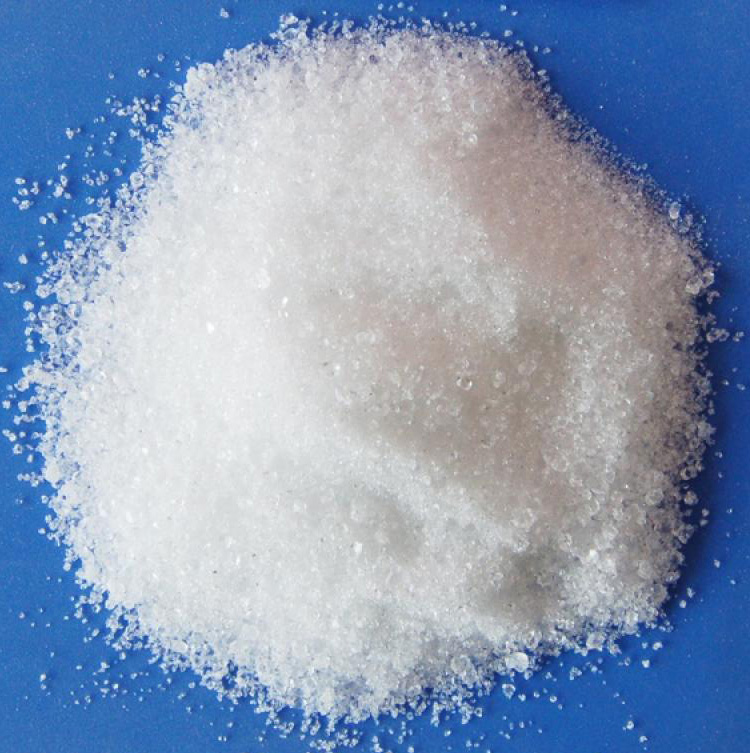PRODUCT NAME: Acesulfame K
CHARACTERISTICS:
Acesulfame K or acesulfame potassium is a calorie-free sugar substitute.
Chemical formula: C4H4KNO4S
Molecular weight: 201.24 g/mol
CAS No.: 55589-62-3
EINECSN: 251-622-6
Standard: FCCVI, E950
HS Code: 29349910
PROPERTIES:
Similar taste to sucrose
High sweetness: 200 times sweeter than sucrose, as sweet as aspartame.
Easily dissolved in water under room temperature.
Calorie-free
Synergistic effect: Acesulfame-K could be used with other sweeteners which can increase 20-40% sweetness.
Great stability under heat, moderately basic and acidic condition.
ADVANTAGES
High Stability
Acesulfame-K can preserve for 10 years under general condition.
No sign of any decomposition.
No absorption of moisture in the air.
Stable to high temperature of 225℃.
Stable within PH2-10, does not react with other food composition or additives when use together.
Sugarless, calorie free, good for tooth.
Reduces the production cost
Guarantee and extend the product shelf life.
HISTORY OF ACESULFAME-K
1976, Acesulfame-K was first synthesized
1983, EU approved its use in food and beverage
1988, FDA approved its use in table sweetening agent, gum and coffee
1992, China approved its use in food and beverage
1994, FDA approved its use in syrup, bakery and dairy products
1995, FDA approved its use in alcoholic drink
1998, FDA approved its use in soft drinks
2000, Japan approved its use
SAFETY
The ADI value and the relative sugar amount for the adults whose weight is above 60kg:
|
ADI |
ADI |
ADSE |
ADSE |
|
0-15 mg/kg body weight |
0-900 mg/60kg body weight |
0-3 mg/kg body weight |
0-180 mg/60kg body weight |
*ADI=acceptable daily intake for Acesulfame-K
*ADSE=acceptable daily sugar intake
APPLICATION:
Acesulfame-K has good stability and suitable taste, and it is the best sweetener for soft drinks, in addition, it also can be used in bakery products, pastry, solid drink, candy, jam, chewing gum, instant coffee, dairy products, jelly, pudding, sweeting agent and so on.
In the pharmaceutical industry, Acesulfame-K is used in the syrup preparation, sugarcoated tablets, bitter medicine masking agent and so on.
In the cosmetics industry, it is used in the lipstick, toothpaste, gargle and so on.
The application and the maximum consumption of Acesulfame-K in EU standard:
|
Product |
Acesulfame-K (mg/L) |
Product |
Acesulfame-K (mg/kg) |
|
Non-alcoholic beverages |
350 |
Chewing gum |
2000 |
|
Alcoholic drinks |
350 |
Cereal |
1200 |
|
Apple wine and perry |
350 |
Candy |
500 |
|
Non-alcoholic beer |
350 |
Low calorie gam |
1000 |
|
Low calorie beer |
25 |
Dried fruits |
2000 |
|
Black beer |
350 |
Sauce |
350 |
|
Dairy |
350 |
Bakery |
350 |
SPECIFICATION:
|
Item |
Standard (FCCVI, E950) |
|
|
Characteristics |
White odorless freely flowing crystalline powder having an intensely sweet taste, approximately 200 times sweeter than sucrose (3% solution). |
|
|
Identification |
Solubility in water |
Freely soluble |
|
Solubility in ethanol |
Slight soluble |
|
|
Ultraviolet absorption |
227±2nm |
|
|
Test for potassium |
Positive |
|
|
Precipitation test |
Yellow precipitate |
|
|
Assay (%) |
99.0~101.0 |
|
|
Loss on drying (105℃, 2h, %) |
≤ 1.0 |
|
|
Organic impurities (ug/g) |
≤ 20 |
|
|
Impurity A: 3-oxobtanamide(acctylacetamide) (%) |
≤ 0.125 |
|
|
Impurity B: 5-chloro-6-methyl-1,2,3-oxathiazin-4(3H)-one 2,2-dioxide (mg/kg) |
≤ 20 |
|
|
Fluoride (mg/kg) |
≤ 3 |
|
|
Potassium (%) |
17.0~21.0 |
|
|
Heavy metals (mg/kg) |
≤ 5 |
|
|
Arsenic (mg/kg) |
≤ 3 |
|
|
Lead (mg/kg) |
≤ 1 |
|
|
Selenium (mg/kg) |
≤ 10 |
|
|
Sulfate (%) |
≤ 0.1 |
|
|
PH (1.0% solution) |
5.5~7.5 |
|
|
Mercury (mg/kg) |
≤ 1 |
|
|
Total plate count (cfu/g) |
≤ 200 |
|
|
Coliforms (MPN/g) |
≤ 1 |
|
|
Yeast and moulds (cfu/g) |
≤ 100 |
|
|
E.Coli |
Negative |
|
|
Salmonella |
Negative |
|
|
Particle size (mesh) |
30~100 |
|
PACKAGE:
Net weight: 25kgs, cardboard drum or box, sealed by food safe polyethylene bags.
Cardboard drum: Φ325mm*395mm, 18.0MT per 20’ container without pallets and 16.0MT per 20’ container with pallets.
Cardboard box: 360mm*360mm*270mm, 20.0MT per 20’ container without pallet and 18.0MT per 20’ container with pallets.
STORAGE AND TRANSPORTATION:
The product should be stored on the pallet, in a light-proof, well-closed, cool, dry and ventilated place. Following the above guidelines should insure 24-month shelf life. After opening the original packing, the complete content should be used immediately. Material can be microbiologically contaminated from unhygienic environment. It is a non-dangerous product and can be transported as a common chemical product. Protect them from sunshine or rain. Must not be loaded and transported with toxic, hazard outstand polluting substances. Handle with care in order to avoid damaging the package.
QUALITY AND SAFETY ASSURANCE:
Controlled under certified quality system ISO and product safety is ensured by established safety system.
TEST METHOD: Full details and test method are available on request.
 Tel: +86-532-86990169|
Tel: +86-532-86990169| Email: sales@dailyfoodgroup.cn
Email: sales@dailyfoodgroup.cn

